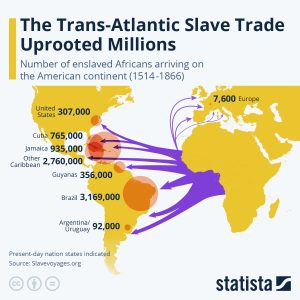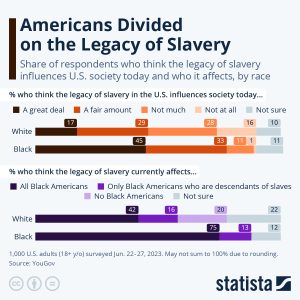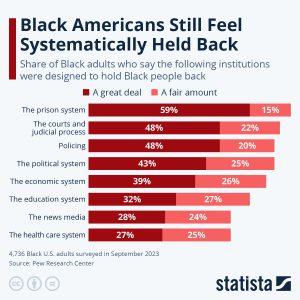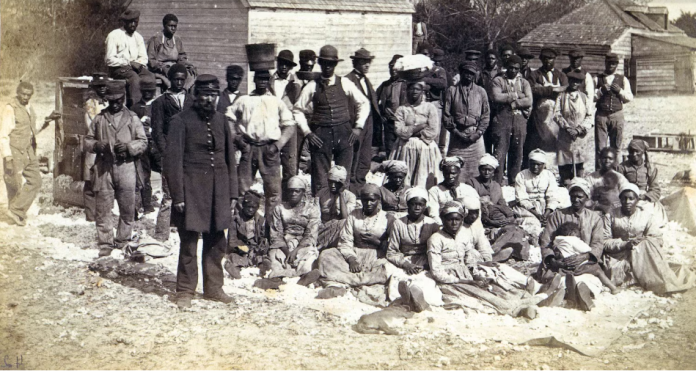400 years ago, in August 1619, the first ship with enslaved Africans destined for the United States arrived in what was then the colony of Virginia. But the cruel history of the trans-Atlantic slave trade begins much earlier and goes on much longer – for more than 350 years.
In fact, many enslaved people lived in the English colonies in North America before that date. They came to the present-day U.S. via Spanish and Portuguese colonies, where enslaved Africans arrived as early as 1514, or were transferred as bounty from Spanish or Portuguese ships.
 The United States are heavily associated with slavery and the capture and forceful relocation of Africans. Around 300,000 disembarked in the U.S. directly, while many more arrived via the inter-American slave trade from the Caribbean or Latin America. It is estimated that almost 4.5 million enslaved Africans arrived in the Caribbean and another 3.2 million in present-day Brazil.
The United States are heavily associated with slavery and the capture and forceful relocation of Africans. Around 300,000 disembarked in the U.S. directly, while many more arrived via the inter-American slave trade from the Caribbean or Latin America. It is estimated that almost 4.5 million enslaved Africans arrived in the Caribbean and another 3.2 million in present-day Brazil.
Around 40 percent of Africans uprooted in slavery are believed to have come from Angola in Southern Africa, with another 30 percent who came from the Bay [or Bight] of Benin in West Africa. The numbers taken from database project SlaveVoyages.org indicate the number of Africans disembarking. Many more died on the way because of lack of food and water and horrid conditions aboard the slave ships.
Others were uprooted in the trans-Saharan, the Red Sea and the Indian slave trade, which partly predated the trans-Atlantic slave trade. It is estimated that close to 20 million people were forced to leave the African continent enslaved. By 1800, this had decimated the African population to half the size it would have been had slavery not occurred.
 Americans divided on legacy of slave trade
Americans divided on legacy of slave trade
Divides persist between many Black and white Americans’ views on the ongoing impacts of slavery in the United States. According to a poll by YouGov conducted in 2023, 52 percent of U.S. respondents believe that the legacy of slavery still influences society today either a fair amount or a great deal. Along racial lines a starker contrast exists, with 78 percent of Black Americans saying the same, versus just 46 of white Americans.
When asked more specifically about who the legacy of slavery currently affects, respondents again answered differently. 75 percent of Black respondents said all Black Americans are affected by the legacy of slavery today, while 13 percent of Black respondents said only Black Americans who are descendants of slaves. No Black respondents selected the option for no Black Americans. Of the white respondents, only 42 percent said all Black Americans are still affected, 16 percent said only Black Americans who are descendants of slaves and 20 percent selected the option for no Black Americans.
65 percent of Black Americans said that America’s wealth as a nation today is tied to slavery, while only 26 percent of white Americans held the same view. Democrats were more likely to agree that current national wealth is significantly tied to the work done in the past by slaves (50 percent) than Independents (32 percent) or Republicans (15 percent).
YouGov then asked respondents about which systems or markets Black Americans face prejudice today. The criminal justice system (58 percent), political system (46 percent), health care system (44 percent) and housing market (44 percent) were among the options to receive the highest shares of all respondents agreeing that discrimination is currently a problem there.
 Black Americans still feel systematically held back
Black Americans still feel systematically held back
On July 2, 1964, Lyndon Johnson signed the Civil Rights Act into law. To this day, the landmark bill is considered one of the most significant legislative achievements in American history, marking a key milestone in the country’s pursuit of racial equality.
The bill outlawed discrimination based on race, color, religion, sex or national origin and mandated the end of racial segregation and discrimination in public accommodations, education and employment.
“We have talked long enough in this country about equal rights. We have talked for one hundred years or more. It is time now to write the next chapter, and to write it in the books of law,” President Lyndon B. Johnson said to members of Congress at the time, urging them to take action and pass the civil rights bill proposed by his predecessor John F. Kennedy, who had been assassinated the year before.
60 years later, Black Americans face a situation that is vastly improved compared to the systematic discrimination of the past, and yet, many racial disparities persist to this day. Whether it’s in terms of income, wealth, education, imprisonment or health outcomes – statistically, Black Americans fare significantly worse than Americans of other races and ethnicities.
And while a recent Pew Research survey showed that 52 percent of U.S. adults think that the country has made a great deal or a fair amount of progress in ensuring equal rights for all people over the past 60 years, an equally high share of Americans agree that these efforts haven’t gone far enough.
 Among Black Americans, the view on progress is much more negative with just 30 percent of respondents saying that significant progress has been made and 83 percent thinking that efforts to ensure equal rights have been insufficient.
Among Black Americans, the view on progress is much more negative with just 30 percent of respondents saying that significant progress has been made and 83 percent thinking that efforts to ensure equal rights have been insufficient.
Further highlighting the degree to which Black Americans feel discriminated against until this day, another Pew survey shows that the majority of Black adults don’t just feel treated unfairly out of negligence, they feel held back systematically across various U.S. institutions.
According to the September 2023 survey of 4,736 Black U.S. adults, 74 percent of respondents think that the U.S. prison system was designed to hold Black people back. 70 percent of respondents think the same of U.S. courts and the judicial system, while more than 60 percent think that policing, the political system and the economic system were designed to disadvantage Black Americans.
“Black Americans’ mistrust of U.S. institutions is informed by history, from slavery to the implementation of Jim Crow laws in the South, to the rise of mass incarceration and more,” the Pew Research Center writes, but it is also informed by personal experience. 75 percent of Black adults say that they’ve personally experienced discrimination or unfair treatment because of their race or ethnicity, and among the victims of discrimination 73 percent say that it made them feel like the system was designed to keep them down.
Buchholz and Fleck write for Statista


